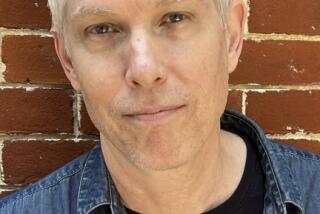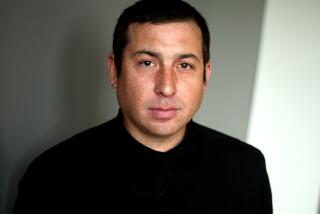Evan Wright: Going where the wild things are
For most people, spending time with a violent, Tabasco-guzzling Oregon anarchist, a teenage member of the Aryan Brotherhood, opera-loving lawyers whose dog fatally mauled an innocent woman and an eternally wired, drugged-out Hollywood agent would not be their idea of fun.
For Evan Wright, though, encounters with such people are so powerful he has a hard time saying goodbye.
“I feel a kind of kinship with big flaming [screw-ups],” says Wright, 43, as he sits in a cafe near his West Los Angeles office and discusses the people about whom he tends to write.
These characters of Wright’s -- “exiles from the mainstream of American culture,” he calls them -- reside at the center of his second book, “Hella Nation: Looking for Happy Meals in Kandahar, Rocking the Side Pipe, Wingnut’s War Against the Gap, and Other Adventures With the Totally Lost Tribes of America” (Putnam: 338 pp. $25.95). It’s a follow-up, of sorts, to his 2004 debut, “Generation Kill,” which detailed the author’s adventures while he was embedded with a Marine battalion in Iraq. (The book was made into a 2008 HBO miniseries by David Simon and Ed Burns of “ The Wire.”)
“Hella Nation” is a collection of pieces that initially appeared from 1997 to 2007 in, among other places, LA Weekly, Rolling Stone and Vanity Fair. It represents, Wright suggests, “a kind of autobiography.” This, he goes on, is the role of the journalist -- to inhabit the lives he or she writes about. “It’s a powerful experience to merge with somebody,” he says, comparing it to a science-fiction story in which a brain is put into another body.
Wright is dressed in a gray T-shirt, jeans and a tan leather jacket. Big and fit but carrying a bit more height than he seems to know what to do with, he is groggy from jet lag after an unexpected trip to Japan. In contrast, perhaps, to the subjects he takes on, he’s no cocky, macho risk-taker but gentle and humble -- or maybe just a little dazed.
Wright works in an area that might be called extreme journalism: adrenaline-fueled and on the edge. In other hands, this can lead to “Borat”-like excesses. Yet Wright is not only visceral but also smartly analytical: A Vassar history major, he views subcultures and fringe characters with an almost scholarly detachment.
And he gets amazing stuff from his subjects, who seem to confess everything to him. During a 1990s murder trial, such a confession was literal, and legally binding.
“Several of my editors wonder why people tell me so much,” Wright says sheepishly. “I think it’s because I’m from Ohio.”
Wright had wanted to be a writer since he was a teenager growing up in what he calls “blue-collar, middle-class” Willoughby, outside Cleveland, a place filled with kids not unlike the Marines in “Generation Kill.”
His folks were attorneys, but his friends were hillbillies; some hung velvet Elvis paintings without irony.
Inspired by Mark Twain, whose skepticism he likens to that of the Sex Pistols, Wright knew he wanted real experiences of the world rather than to lock himself in an ivy-covered fortress. When he ended up in such a fortress, at Vassar, he studied medieval and Renaissance history, and continued to write.
In the early 1990s, he moved to Los Angeles to try to break into screenwriting. His screenplays went nowhere, but in 1995, he was hired as entertainment editor at Hustler.
“I was 30, divorced and at the end of a screenwriting career that had been flatlining for several years,” Wright remembers in “Hella Nation.” “Not only had I failed as a writer, but I had functioned only marginally in a variety of menial, no-brainer day jobs.” He was a sometime drug user and a dedicated alcoholic.
But somehow, Wright began to turn the corner while at Hustler, reviewing pornographic films and writing the starlets’ “first person” life stories in Barely Legal magazine.
Then as now, he was drawn to extreme characters. “They have to be,” he says, “at least antiheroes, if not true scoundrels.”
A bigger turning point came in 2003, when he decided to go to Iraq for Rolling Stone, embedding with the Marines’ 1st Recon Battalion.
“I studied history,” Wright says flatly, “and nothing is more history-making than war.” He was influenced by English writers who’d gone to the Spanish Civil War -- W.H. Auden, George Orwell -- as well as Christopher Isherwood’s “Berlin Stories.” The history he’d read (Herodotus, chronicles of the Crusades) was as important to him as “Apocalypse Now.”
Immersion technique
“He had no experience covering war,” says Dana Brown, Wright’s Vanity Fair editor. “There were a lot of reporters who went, a lot of them bailed. His pieces were so good, and his book so good, because he just immersed himself. He’s got that thing where he just keeps going.”
Wright wanted to show how soldiers -- stereotyped for years as dangerous rednecks, then declared instant American heroes upon the declaration of war -- were much more complicated and varied.
In Iraq, he met Marines who, he writes, “would be virtually unrecognizable to their forebears in ‘The Greatest Generation.’ Many are on more intimate terms with videogames, reality TV shows and Internet porn than they are with their own parents.”
Wright’s high-octane work has been compared to the “gonzo journalism” of Hunter S. Thompson. The author, though, thinks the similarities are superficial: “ ‘[G]onzo’ speaks of writing that is more about the reporter than the subject,” he writes. “With few exceptions, my intent has always been to focus on my subjects in all their imperfect glory.”
In his profile of Hollywood agent Pat Dollard, who went from representing Steven Soderbergh to aiming to topple “liberal Hollywood,” Wright became part of the story. During the course of his reporting, Dollard lost almost everything and at one point asked Wright to buy him guns. (The writer declined.)
Brown calls that story “one of my most exhilarating moments as an editor. I think he turned in the piece about a year late. I’d get these messages in the middle of the night, ‘Still working on it.’ And then nothing for months. He goes a little further than anyone else.”
Wright may go further, but he also gives little away. He’s a fascinating storyteller but not much interested in small talk. There’s an odd passivity or detachment to him; he does not ski or ride horses because of the risk of injury, but he has been shot at, bombed and attacked.
“Years ago,” he notes, “my therapist said, ‘You seem to have no sense of danger.’ Later, I said, ‘God, what if she’s right?’ ”
One of the things that most angers Wright -- who considers himself an artist -- is the way literature has been taken over by academia. Two decades after leaving college, he is “now fully convinced that American letters have become thoroughly destroyed by the creative writing farm system.”
Another source of outrage is the tyranny of the image, meaning television. He refuses to carry a video camera, despite many requests, because he thinks words are truer.
“We need a journalism that’s a countervailing force to our image-driven media,” Wright declares. “I try to overthrow a dominant idea about my subject with every story. We print people need to attack the Matrix.”
And yet, for a guy who stands up for the Word, Wright is on good terms with the Image. Among his upcoming projects is a book about Miami gangster Jon Roberts (born Riccobono); he’s also writing the screenplay for director Peter Berg.
Home schooling
More personal is a reported memoir about a home for “incorrigibles” to which he was sent as a troubled 13-year-old: He had been arrested for selling “marijuana” to classmates that turned out to be catnip. The home -- called the Seed, he recalls -- “used North Korean brainwashing techniques to straighten out kids: sleep deprivation, threats of physical violence, humiliation and boxing.”
He learned “Lord of the Flies”-like lessons about hierarchy and the way people worship a strong leader. “The group was trying to destroy me as a person,” Wright says. “So I respect people who go against the dominant paradigm.”
In his work, Wright is struck by how rebellion is co-opted by the larger society and sold back to people -- the way anarchists’ black hoodies end up at the Gap.
All this has given him a respect for people who really are nonconformists, who can’t be co-opted, whose difference is genuine.
“Unfortunately,” Wright says with a laugh, “a lot of those people are criminals. I find something fascinating about that.”
Timberg blogs at scott-timberg.blogspot.com.
More to Read
The biggest entertainment stories
Get our big stories about Hollywood, film, television, music, arts, culture and more right in your inbox as soon as they publish.
You may occasionally receive promotional content from the Los Angeles Times.






